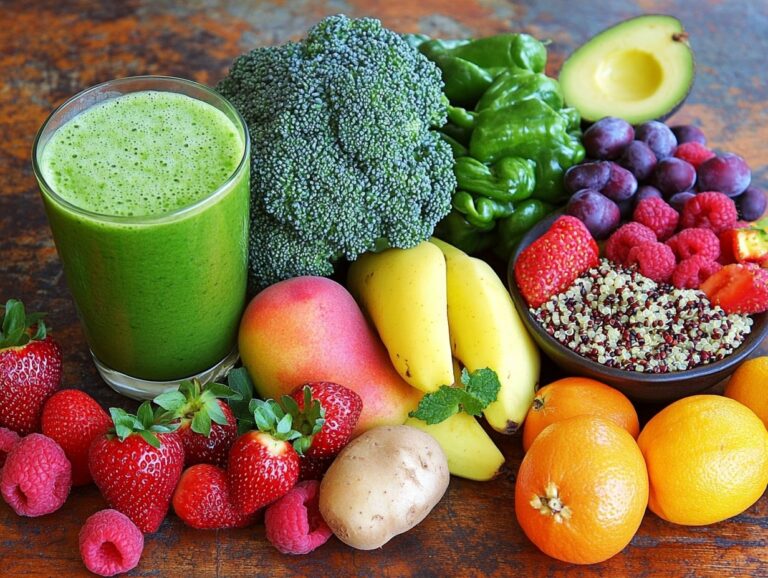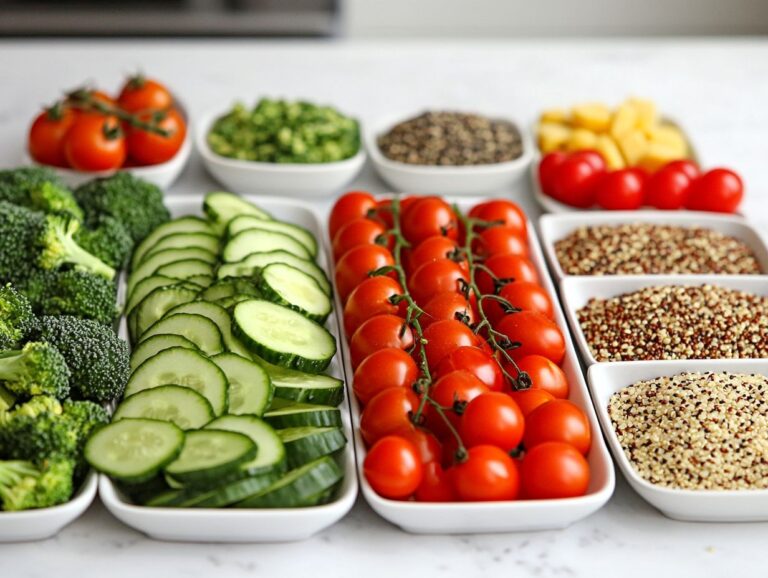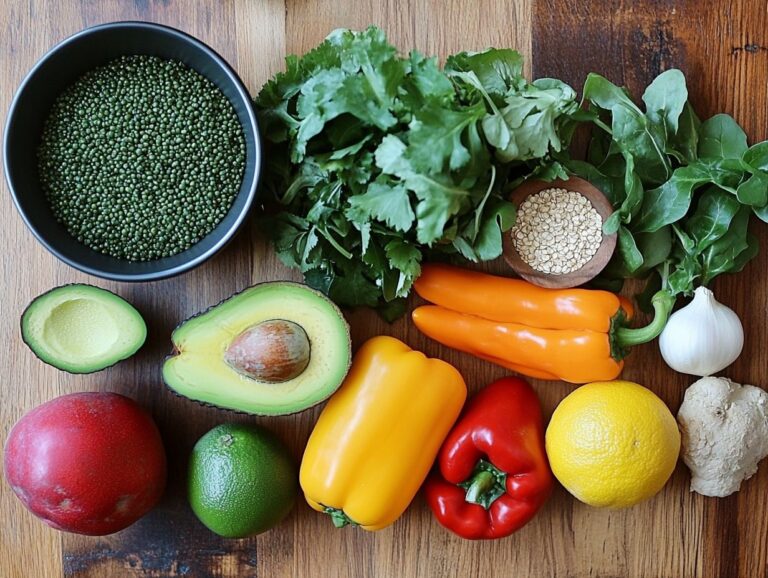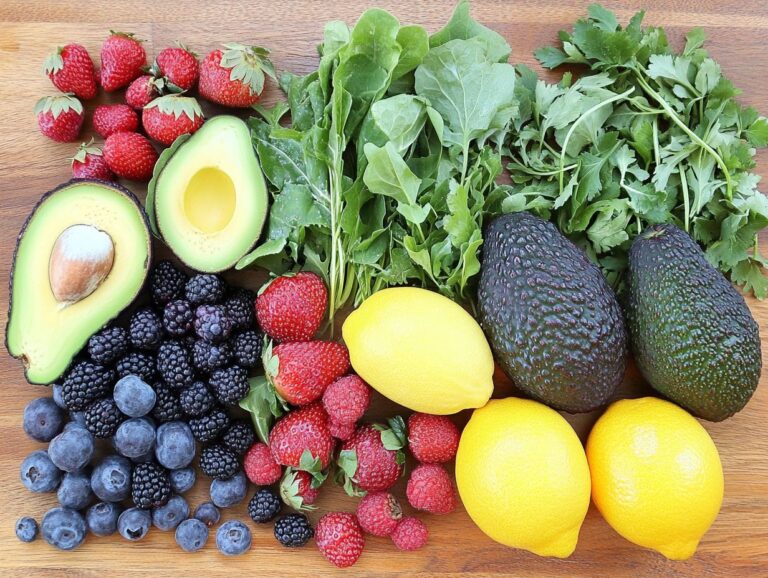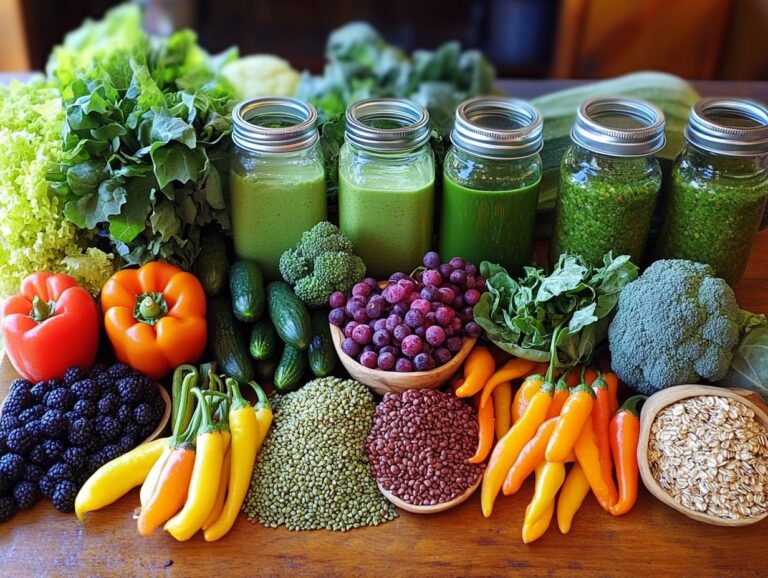The Vegan Atkins Diet, sometimes referred to as the Eco Atkins, is a modern variation of the traditional low-carb Atkins Diet, designed to promote healthy weight loss and offer various health benefits while addressing the challenges associated with a vegan lifestyle. This article explains how the Vegan Atkins Diet operates, outlines what foods to include and avoid, and discusses the benefits and risks involved. Additionally, it covers protein sources, provides success tips, and includes all the essential details you need to determine if this diet is suitable for you.
Key Takeaways:
- The Vegan Atkins Diet is a plant-based, low-carb diet that promotes weight loss and other health benefits.
- The Vegan Atkins Diet can be tailored to individual preferences and dietary needs, with a variety of protein, fat, and carb sources to choose from.
- While the Vegan Atkins Diet can lead to weight loss, it is important to consult a healthcare professional and be aware of potential risks and nutrient deficiencies.
What is the Vegan Atkins Diet?
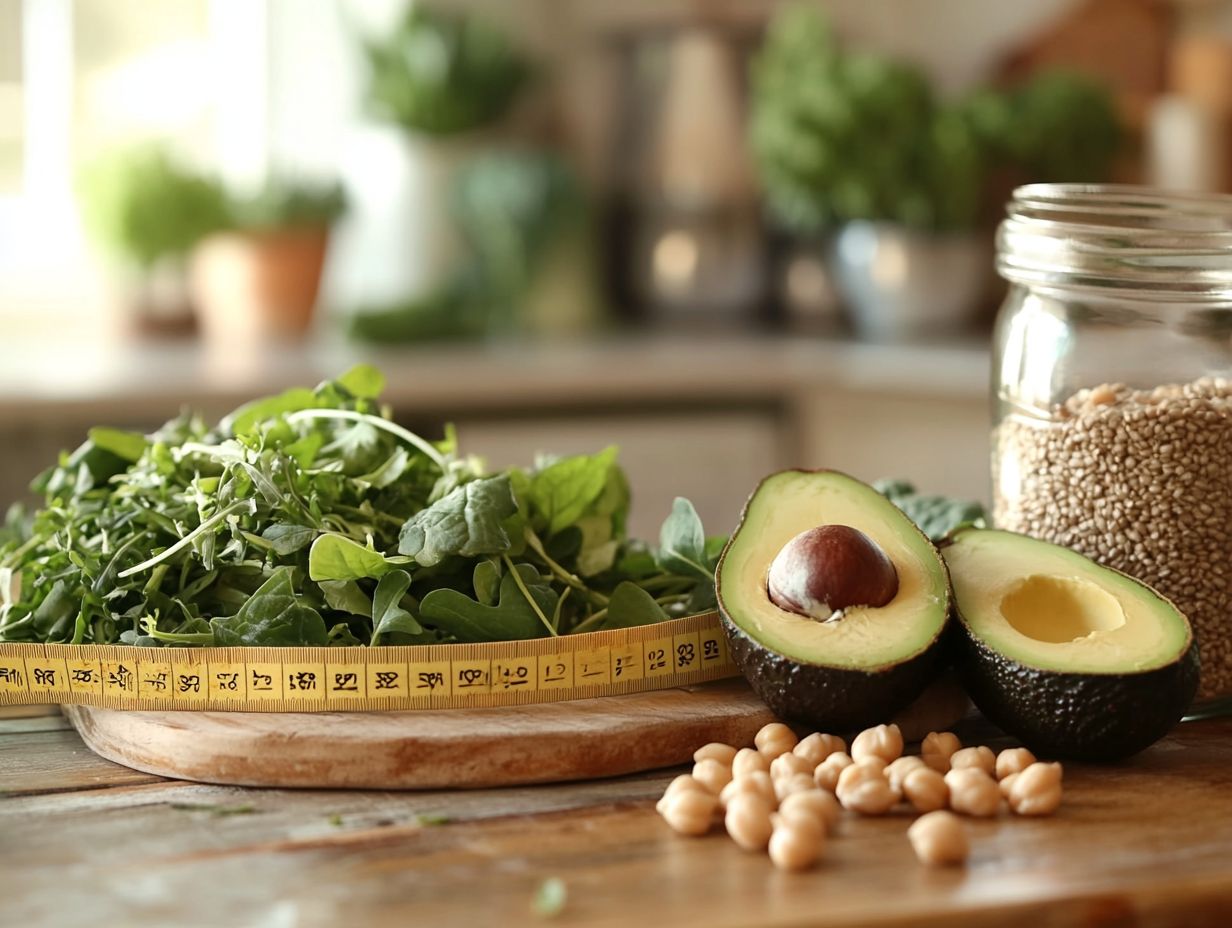
The Vegan Atkins Diet is a plant-based adaptation of the Atkins diet, designed for individuals seeking the weight loss benefits of a low-carb approach while adhering to a vegan lifestyle.
This diet emphasizes nutrient-dense, high-protein foods sourced from beans, nuts, and soy products. Participants are encouraged to concentrate on health goals such as lowering blood pressure, managing cholesterol levels, and fostering healthy lifestyle habits.
By eliminating animal products, the Vegan Atkins Diet not only supports personal health objectives but also addresses environmental concerns associated with food choices.
How Does the Vegan Atkins Diet Work?
The Vegan Atkins Diet is a low-carbohydrate diet designed to encourage the body to enter a state known as ketosis, during which it primarily burns fat for energy instead of carbohydrates, a key concept in low-carb dietary approaches.
This approach not only promotes weight loss but also ensures the intake of essential nutrients from plant-based protein sources. The diet emphasizes caloric intake and meal planning, with a focus on incorporating high-fiber foods.
This is particularly beneficial for individuals managing diabetes or obesity, as it helps maintain stable blood glucose and insulin levels.
What Are the Differences Between the Vegan Atkins Diet and the Traditional Atkins Diet?
The key differences between the Vegan Atkins Diet and the traditional Atkins Diet lie in their sources of protein and fat. While the traditional Atkins Diet incorporates various animal products, the Vegan Atkins Diet exclusively utilizes plant-based protein sources, such as legumes, nuts, and soy products, to meet its nutritional targets.
This shift to plant-based foods not only affects the macro-nutritional profiles but also enhances the overall health benefits of the diet, particularly in terms of cholesterol levels and heart disease risk. By primarily consuming plant-based foods, the Vegan Atkins Diet reduces saturated fat intake, which is typically high in traditional animal products.
As a result, many users experience improved cardiovascular health indicators as their lipid profiles improve. Additionally, the increased variety of fiber-rich foods in the Vegan Atkins Diet promotes better digestive health and may assist with weight loss.
Consuming whole and unprocessed food options can also lead to increased energy and overall well-being, highlighting the significant health benefits of moving away from animal products.
What Can You Eat on the Vegan Atkins Diet?
The Vegan Atkins Diet features low-carb food choices that emphasize nutrient-dense plant-based options, enabling individuals following this diet to enjoy a diverse range of meals while adhering to their dietary preferences.
This diet includes a variety of vegetables, legumes, high-protein nuts, and soy products such as tofu and tempeh. Together, these foods provide a balanced intake of essential amino acids while maintaining a focus on weight control.
What Are the Main Sources of Protein on the Vegan Atkins Diet?
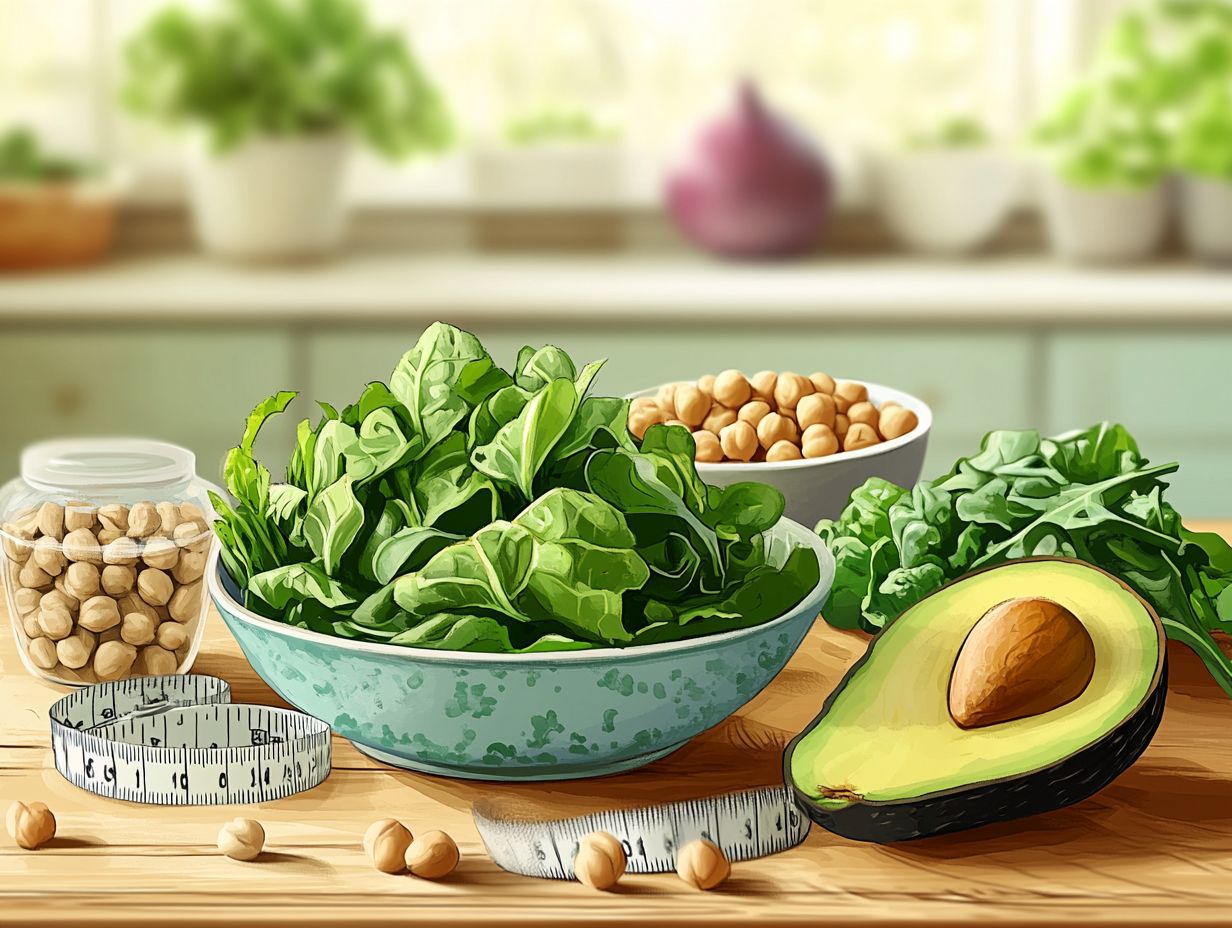
The primary source of protein for individuals following a Vegan Atkins Diet comes from plant-based foods. Legumes, nuts, and soy products are essential for meeting protein needs without consuming animal or dairy products.
By choosing high-protein legumes such as beans and lentils, along with soy products like tofu and tempeh, individuals can ensure they receive adequate amounts of essential amino acids while supporting overall health and reducing the risk of certain nutritional deficiencies.
Quinoa and chia seeds also offer excellent sources of protein, along with healthy omega-3 fatty acids and dietary fiber. Nuts, such as almonds and walnuts, provide a crunchy, nutrient-dense snack option that is calorically rich.
Whether incorporated into a healthy soup, salad, or stir-fry, the variety of plant-based proteins makes it easier to include them in daily meal plans.
When preparing meals, it is important to combine different protein sources to create balanced, protein-rich dishes. This not only enhances the enjoyment of meals but also improves nutrient absorption and strengthens the body’s defenses against deficiencies that can occur with restrictive diets.
What Are the Main Sources of Fat on the Vegan Atkins Diet?
Healthy fats are an integral part of the Vegan Atkins Diet, with sources including vegetable oils, nuts, and avocados, all of which support an eco-friendly, vegan-friendly lifestyle. These foods provide essential fatty acids and promote overall health.
By choosing plant-based fats, individuals can enjoy numerous health benefits while adhering to low-carb dietary patterns and managing caloric intake. Incorporating healthy fats, such as those found in olive oil and flaxseeds, is essential for providing energy and plays a significant role in enhancing cardiovascular health.
These fats can help reduce bad cholesterol levels and potentially lower the risk of cardiovascular disease. Additionally, healthy fats in a Vegan Atkins Diet support weight management by increasing satiety, helping individuals feel full for longer, which can lead to healthier food choices.
Understanding the effects of healthy fats can give the power to those following the diet to maximize its health benefits.
What Are the Main Sources of Carbohydrates on the Vegan Atkins Diet?
The Vegan Atkins Diet emphasizes low-carb foods, with carbohydrates sourced from starchy vegetables and select whole grains that are rich in dietary fiber, aligning with both vegetarian and high-protein dietary guidelines. This approach promotes digestive health while keeping overall carbohydrate intake low, enabling individuals to achieve their weight loss and health goals.
According to the Atkins website, foods such as lentils, quinoa, and sweet potatoes can enhance nutrient density while providing adequate carbohydrates. These sources are abundant in antioxidants and phytochemicals, which support overall health. Additionally, leafy greens and cruciferous vegetables can help increase fiber intake, contributing to feelings of fullness and promoting a healthy gut microbiome.
A well-structured Vegan Atkins Diet can ultimately lead to balanced blood sugar levels and sustained energy throughout the day.
What Are the Benefits of the Vegan Atkins Diet?
The Vegan Atkins Diet offers numerous health benefits, including effective weight loss, improved cholesterol levels, and better management of blood pressure and insulin levels, which may help in preventing heart disease and managing diabetes.
These advantages make the Vegan Atkins Diet an appealing option for individuals looking to enhance their overall health. By promoting a plant-based approach to low-carb eating, the Vegan Atkins Diet enables individuals to achieve positive health outcomes while also addressing obesity and its associated health issues.
Can You Lose Weight on the Vegan Atkins Diet?
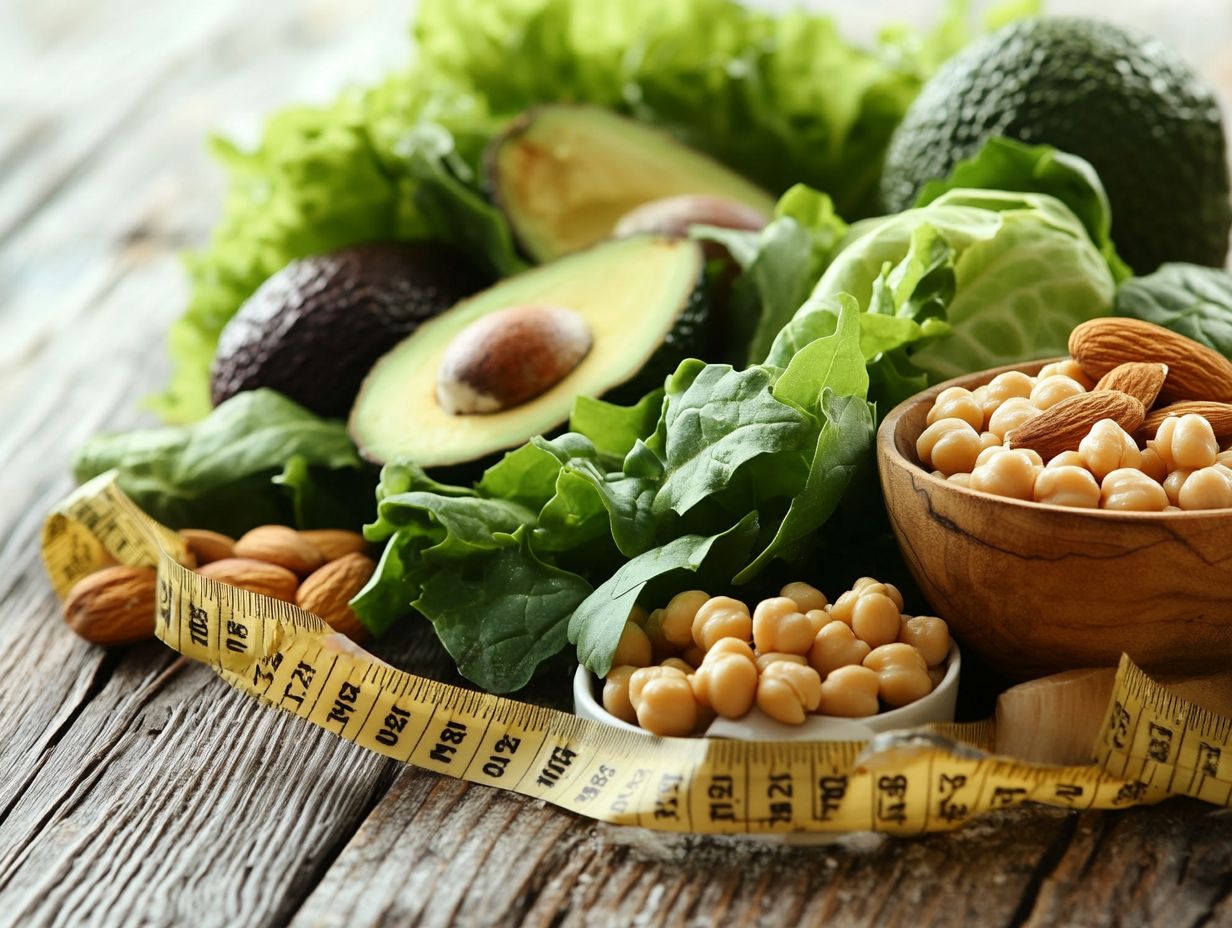
Yes, individuals can lose weight on the Vegan Atkins Diet by managing their calorie intake and focusing on meal preparation with healthy, low-carb foods. This approach not only supports weight loss but also enhances overall health by providing plant-based proteins and healthy fats.
To achieve successful weight loss, it is essential to focus on meal planning and preparation that incorporates a variety of vegetables, nuts, seeds, and legumes, ensuring that all meals align with the low-carb framework of the diet.
Portion control is also crucial; individuals should monitor their serving sizes to prevent overeating, even when consuming healthier foods. Including high-fiber foods can help people feel satisfied for longer periods, reducing the temptation to snack on unhealthy options.
Regularly assessing progress and adjusting meal plans can further support weight management efforts and contribute to improved health.
What Other Health Benefits Does the Vegan Atkins Diet Offer?
The Vegan Atkins Diet offers several benefits, including aiding weight loss, improving blood glucose control, reducing the risk of heart disease, and increasing dietary fiber intake, which contributes to better overall health.
Plus supporting personal weight loss goals, this diet also addresses important environmental issues associated with animal products. The emphasis on a diverse range of plant-based foods ensures the intake of essential nutrients while reducing the risk of chronic diseases such as Type 2 diabetes and certain types of cancer.
Staples of the Vegan Atkins Diet, including legumes, whole grains, and vegetables, are rich in dietary fiber, promoting digestive health and helping to stabilize cholesterol levels, which can enhance cardiovascular health.
Additionally, adopting this lifestyle may result in a lower carbon footprint, as plant-based and vegetarian diets typically require fewer natural resources and generate fewer greenhouse gases compared to diets that include animal products.
What Are the Potential Risks of the Vegan Atkins Diet?
The Vegan Atkins Diet offers several advantages; however, it also carries risks, including potential nutritional deficiencies, particularly in vitamin B12, iron, and omega-3 fatty acids, due to the limitations on animal products.
Individuals following this diet must be diligent in their meal planning to ensure they obtain all the essential nutrients necessary for maintaining good health.
Is the Vegan Atkins Diet Safe for Everyone?
The safety of the Vegan Atkins Diet can vary from person to person, as it may not be suitable for everyone, particularly those with specific dietary restrictions, pre-existing chronic health conditions, or unique nutritional needs.
It is essential to consult with healthcare professionals or nutritionists before starting this diet to ensure it aligns with individual health goals and lifestyles. A personalized approach to dietary choices is crucial, given the potential health risks associated with restrictive eating patterns.
Individuals who are pregnant, have a history of eating disorders, or have diabetes should exercise additional caution when considering the Vegan Atkins Diet.
Are There Any Nutritional Deficiencies to Be Aware of on the Vegan Atkins Diet?
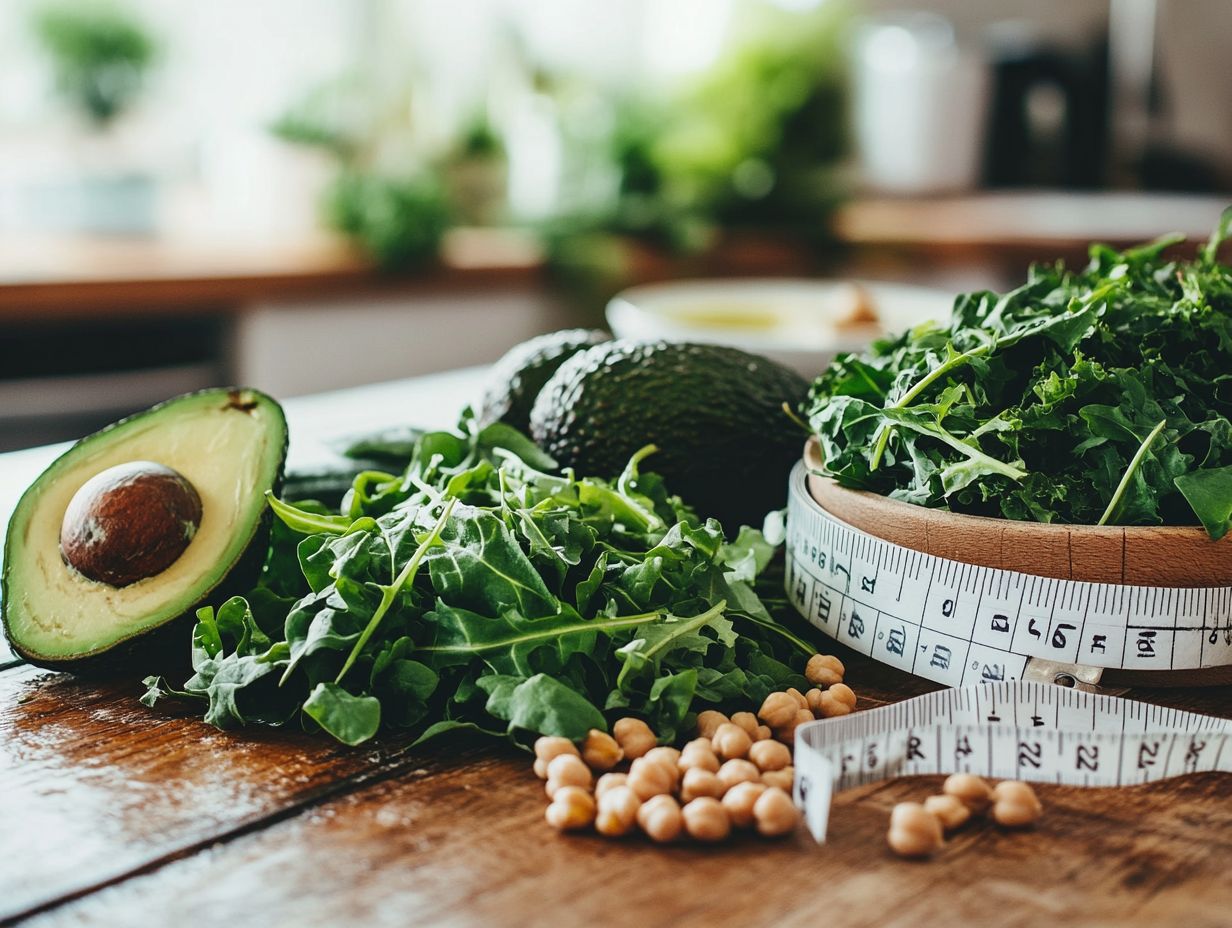
Yes, practitioners of the Vegan Atkins Diet may face nutritional deficiencies, particularly in vitamins and minerals that are typically found in animal products, such as vitamin B12, iron, and calcium. To address these deficiencies, they may need to consider multivitamins or fortified foods. Careful meal planning is essential to ensure that all necessary nutrients are consumed in adequate quantities while adhering to a vegan lifestyle.
Incorporating a wide variety of plant-based sources rich in these nutrients is a beneficial step to mitigate potential deficiencies.
Common nutrients that may be deficient in a Vegan Atkins Diet include:
- Vitamin B12: Usually obtained from dairy or meat, but can also be found in fortified plant milks and cereals.
- Iron: Present in legumes, lentils, and leafy green vegetables like spinach. Consuming iron-rich foods alongside vitamin C-rich foods can enhance absorption.
- Omega-3 Fatty Acids: Typically sourced from fish and seafood, omega-3s are often lacking in vegan diets; algae-based supplements can be a suitable alternative.
- Calcium: Generally found in dairy products, calcium can be obtained through fortified plant milk, leafy green vegetables, and sesame seeds.
- Iodine: Usually derived from seafood, iodine can be provided by seaweed, iodized salt, and fortified plant milk.
How to Get Started on the Vegan Atkins Diet?
To successfully implement the Vegan Atkins Diet, it is essential to follow the guidelines of the approach, plan appropriately, and prepare for the transition to ensure long-term adherence.
Effective meal preparation can help you avoid the challenges associated with both low-carb and vegetarian/vegan diets by promoting the inclusion of nutrient-dense foods.
What Are Some Tips for Success on the Vegan Atkins Diet?
To succeed on the Vegan Atkins Diet, it is essential to focus on meal planning, explore a variety of low-carb recipes, seek community support, set health goals, and track progress to ensure long-term adherence to the diet.
Incorporating different plant-based protein sources such as tofu, tempeh, and legumes is crucial, as these foods provide essential nutrients while keeping carbohydrate intake within limits.
Tools like macro-tracking apps can simplify the process of monitoring carb intake, and regularly setting health goals and tracking progress can support a long-term commitment to the Atkins regimen.
Engaging with community support through vegan online forums, local vegan groups, and social media pages allows individuals to connect with others who share similar journeys and goals. These platforms are excellent resources for exchanging tips, recipe ideas, and providing mutual encouragement through various challenges.
To stay inspired and dedicated, meal prepping and experimenting with new vegan ingredients can enhance cooking skills while reinforcing one’s commitment to the journey, ultimately fueling motivation to achieve health goals.
Are There Any Recommended Supplements for the Vegan Atkins Diet?
Individuals following the Vegan Atkins Diet may benefit from certain key supplements, particularly multivitamins that can help address potential nutritional deficiencies associated with veganism.
Specifically, supplementation with vitamin B12, iron, and omega-3 fatty acids can enhance the health benefits of the diet and ensure adequate overall nutrition. Additionally, a high-quality vitamin D supplement is especially important, as sunlight exposure—and consequently natural vitamin D synthesis—can be limited during the winter months.
Zinc and calcium supplements can also be beneficial, supporting immune function and promoting bone health, respectively. For those who struggle to obtain enough protein from their diets, a plant-based protein powder can be a useful option to help meet daily protein requirements.
Incorporating these supplements can promote optimal health while following the Vegan Atkins Diet, leading to increased energy and overall well-being.
